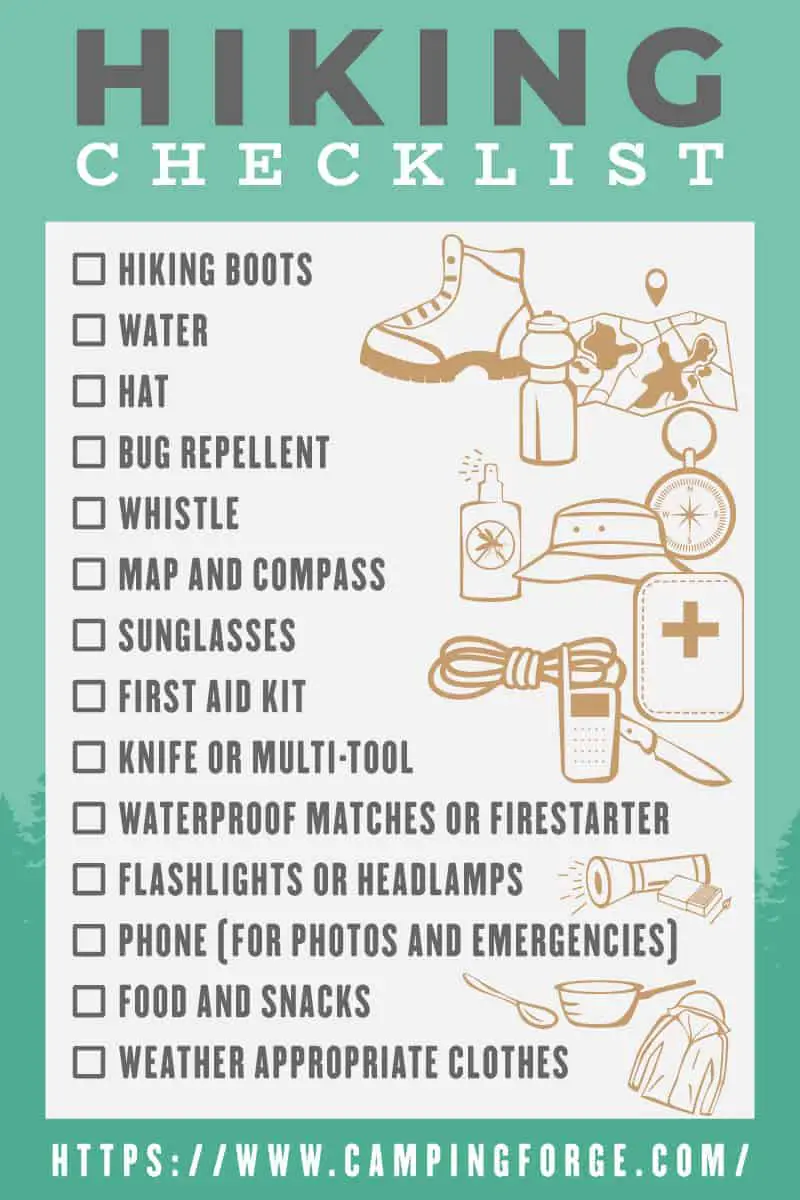The Most Epic Hiking Checklist
If you click and purchase with one of our links, we earn a commission. Thanks.
If you are like millions of people, then you enjoy being outside in nature and hiking. Whether you are planning for an overnight trip (make sure to verify your trail will let you stay overnight) or a day trip then it’s time to start planning your next trip.
Even if you hike on a regular basis, when a hiking checklist is used it can help to ensure that you remember everything that is necessary. Whether you are planning a simple one day hike or you plan to spend the entire weekend out in the wild, don’t risk leaving behind anything important.
No matter what kind of hiking you are planning on doing, it is very important for you to be prepared. You should always expect the unexpected. That way you will be prepared for anything that comes your way. You could slip and fall or get lost. Be sure to take a backpack with you that contains everything you might need. Use the following checklist to pack your backpack with everything you need so that you are always ready, no matter what happens.

The Essentials
Water - Becoming dehydrated can have serious consequences. It can result in you experiencing intense muscle spasms and that can prevent you from being able to walk. You can potentially survive for weeks without food, but it could be fatal to be without water even for just a couple of days.
Hiking Hat - Wearing a hat can help to prevent heat stroke and heat exhaustion whenever the sun is beating straight down on you.
Bug Repellent - Whenever you are hiking in the woods, ticks, and mosquitoes can be a problem. Mosquitoes can spread a number of deadly diseases and ticks may cause Lyme disease. Also, mosquito bites are very itchy and irritating and may cause infections as well.
Whistle - If you were to run into a wild animal like a bear, et lost, or fall and become injured, you could save your life by blowing a whistle. The sound of a whistle can travel much farther than trying to shout for help.
Map and Compass - You will be able to make better decisions and navigate unfamiliar territory if you take these along with you. A map can be particularly useful when you are hiking trails that do not have guides or markings. If you happen to veer off course, a compass will get you headed back in the right direction.
Sunglasses - These can protect your eyes against the rays of the sun. When hiking in snow, they can help to protect against snow blindness. Also, wearing sunglasses can help to protect your eyes from flying debris, bugs, and tree branches.
First Aid Kit - A first aid kit will help with many minor injuries, including bug bites, punctures, minor cuts, and blister. If you experience any life-threatening event or injury, it could help to save your life. If you take any medications, make sure they are included in your first aid kit.
Knife - Always have a knife inside your backpack. You can use a knife to help build a shelter, cut rope, and prepare food. A larger knife might be needed for off-trail hiking in order to hack away thick growth. A small ax can also be used for collecting firewood.
Waterproof Matches or Firestarter - Being able to start a fire could save your life. Or if you get lost, you can build a fire to keep wild animals way and to signal for help. You might also want to build a fire to make coffee with your hiking coffeepot and to cook food.
Flashlights or Headlamps - You should always carry a flashlight in your backpack, whether or not you are planning on hiking overnight. You never know when you could end up stuck out in the woods. Also, take extra batteries with you. A headlamp using LED lights will last for a longer amount of time than a flashlight. They are also hands-free.
Camera - Take your camera along to get incredible shots of nature’s beauty and wildlife. It is an excellent way to store your memories to last for a lifetime.
Food and Snacks - Even if you are only going on a day hike, you will still need to eat. Just in case, take along enough food to last a couple of days.
Extra clothes - Take along outdoors clothes to protect you against the elements. That will allow you to change into dry clothing if it starts to rain. Your clothes can help to protect you from the cold, the sun, and insects.
Always tell a friend or family member where you are going to hike. Be sure to designate a time when you will be contacting them so that they will know you got home safely. That way, if they don’t hear from you, they will know to contact the authorities to go search for you. It is always best to go hiking with somebody else. However, if you prefer to go on your adventure by yourself, at least make sure someone knows where you are going.
If you are camping out or hiking for the whole weekend, you will need to have a sleeping bag and hiking tent. Make sure to take all of the essentials with you. The extras that you take with you will depend on how much weight you can carry.
So now that your hiking backpack is prepared, it’s time for you to start on your adventure and go exploring. It is very important to be careful while still having fun. Hiking offers a great way to enjoy nature and exercise at the same time.